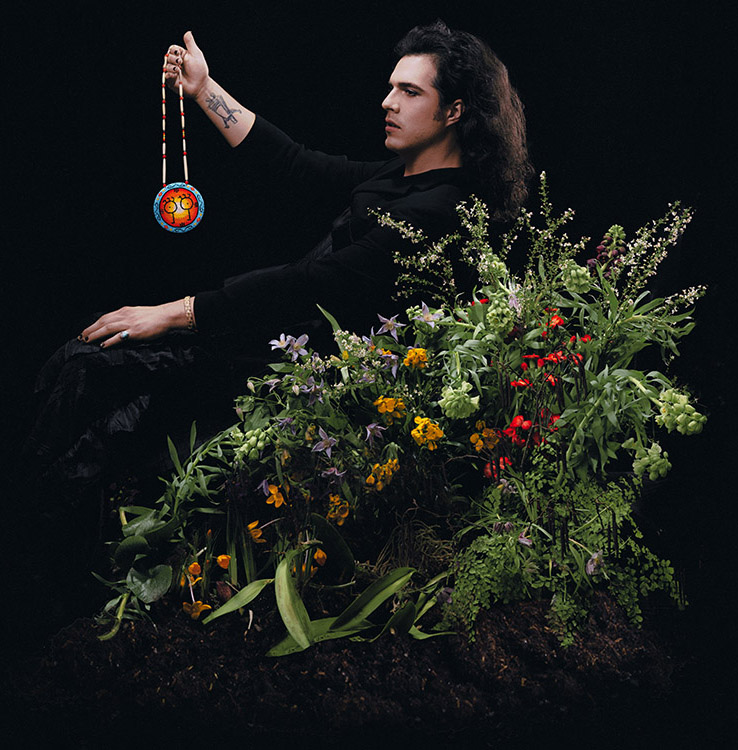Every once in a while, an album emerges that transcends the boundaries of art and music, offering listeners not only a sonic experience but also a glimpse into the heart of a culture, a community, and a historical journey. Jeremy Dutcher’s Motewolonuwok, released on October 6, 2023, is one such album—a deeply stirring and transformative piece of work that not only deserves to be recognized but is fully deserving of winning the 2024 Polaris Music Prize.
Dutcher’s previous album, Wolastoqiyik Lintuwakonawa, which earned him the 2018 Polaris Prize, was nothing short of a musical masterpiece. With it, Dutcher revived his ancestral Wolastoqiyik songs preserved on wax cylinders from over a century ago, positioning himself as a critical voice in Canada’s Indigenous renaissance. However, with Motewolonuwok, Dutcher has crafted something even more expansive, bolder, and emotionally profound. This album is an exploration of modern Indigeneity, a meditation on healing and reconciliation, and a musical journey that crosses cultural and generational boundaries.
A Bold Leap Forward: Bridging Two Worlds
While Wolastoqiyik Lintuwakonawa was an intimate conversation between Dutcher and his ancestors, Motewolonuwok broadens the dialogue. Not only does it feature additional creative voices—such as Owen Pallett on string arrangements and a full choir—but it also shifts the conversation outward. With songs in both Wolastoqey and English, Dutcher extends his storytelling to non-Indigenous audiences while continuing to address his own community’s struggles, history, and future.
This duality is perfectly embodied in tracks like “Pomawsuwinuwok Wonakiyawolotuwok” (translated to “The People Are Rising”), which features both languages. The track is a powerful anthem for the growing movement of Indigenous sovereignty. Dutcher doesn’t just sing to his people, he engages the broader world in a necessary conversation, demanding attention to the continued fight for recognition and justice for Indigenous peoples.
Healing Through Music
One of the most striking aspects of Motewolonuwok is its capacity for healing. Dutcher understands the transformative power of music, not as a quick fix, but as a long-term process for recovery and reconciliation. This is particularly evident in “Take My Hand,” where Dutcher reaches across cultural divides, offering music as a bridge between Indigenous and non-Indigenous people, and even within his own community. Many members of Dutcher’s own Wolastoqey community no longer speak their native language, so this album becomes an essential vessel for both cultural preservation and healing.
A standout track, “Ancestors Too Young,” poignantly addresses the devastating epidemic of suicide among Indigenous youth. Inspired by Dutcher’s travels to northern communities, the song provides not only a platform for the stories of Indigenous communities grappling with this crisis but also a place for collective mourning and healing. This compassionate focus on the struggles of today’s Indigenous peoples makes Motewolonuwok more than just an album—it is a tool for collective resilience.
The Power of Protest and Storytelling
Dutcher’s ability to convey the urgency of social and political protest shines on tracks like “The Land That Held Them.” Drawing inspiration from Nina Simone’s “Mississippi Goddam,” Dutcher crafts a series of vignettes that highlight the systemic injustices Indigenous communities face. He recounts the tragic stories of Tina Fontaine, Colten Boushie, and the victims of Saskatoon’s Starlight Tours, calling for accountability and change. The song is haunting and harrowing, but it is also a call to action—a powerful protest against the ongoing erasure of Indigenous voices and lives.
This ability to weave personal, historical, and cultural narratives into his music elevates Dutcher’s work into something greater than an album—it becomes a living testament to the struggles and triumphs of his people.
An Artistic Triumph of Sound and Vision
From a purely musical standpoint, Motewolonuwok is a stunning triumph. The blend of piano-based neoclassical arrangements, opera, and traditional Indigenous melodies creates a soundscape that is both experimental and accessible. Tracks like “Together We Emerge” and “Rise in Beauty” close the album on a hopeful note, underlining the belief that, despite the struggles Indigenous people face, there is a way forward—together, in beauty and strength.
Critics have noted that Motewolonuwok is not just an album for Dutcher’s community; it’s an invitation for the world to engage with the complexities of modern Indigeneity. The way Dutcher uses music to build bridges across languages, cultures, and generations is nothing short of extraordinary. One critic aptly described the album as “experimental pop as corrective medicine,” which perfectly captures the essence of Dutcher’s mission. He’s not interested in easy fixes—he’s laying the groundwork for long-lasting change, both in how we view Indigenous cultures and how we engage with music as art.
Why Dutcher Deserves to Win the 2024 Polaris Music Prize
The Polaris Music Prize has always been about recognizing artistic merit above all else, and Jeremy Dutcher’s Motewolonuwok epitomizes that spirit. This album is not only a musical triumph, but also a cultural and political statement. It builds on the foundation Dutcher laid with his debut, but takes his message to new heights, weaving together the past and present, the personal and the communal, in ways that are both heart-wrenching and hopeful.
Motewolonuwok stands out as a work of unparalleled depth, artistry, and significance. It’s an album that not only challenges listeners but invites them into a dialogue about reconciliation, healing, and identity. Jeremy Dutcher’s work is transformative, and Motewolonuwok is a testament to the power of music as both art and activism.
For all these reasons, Motewolonuwok is not just deserving of the 2024 Polaris Music Prize—it is an essential album that will continue to inspire and resonate for years to come.
Sources: WDBM IMPACT 88.9FM , Dominionated

